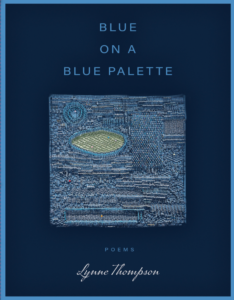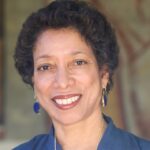Poet Lynne Thompson is chatting with me about her new book, Blue on a Blue Palette.

Bio:
Lynne Thompson served as Los Angeles’ 4th Poet Laureate and received a Poet Laureate Fellowship from the Academy of American Poets. She is the author of four collections of poetry, Beg No Pardon (2007), winner of the Perugia Press Prize and the Great Lakes Colleges Association’s New Writers Award; Start With A Small Guitar (What Books Press, 2015); Fretwork, winner of the 2019 Marsh Hawk Poetry Prize selected by Jane Hirshfield; and,, Blue on a Blue Palette, putblished by BOA Editions in April 2024. A Pushcart Prize and Best of the Net nominee, Thompson is the recipient of multiple awards including the George Drury Smith Award for Outstanding Achievement in Poetry, an Individual Artist Fellowship from the City of Los Angeles, the Tucson Literary Festival Poetry Prize, and the Steven Dunn Poetry Prize, as well as fellowships from the Summer Literary Series (Kenya) and the Vermont Studio Center. She serves on the Boards of the Poetry Foundation, Cave Canem, and The Los Angeles Review of Books. Thompson’s recent work can be found or is forthcoming in the literary journals Best American Poetry 2020, Kenyon Review, The Massachusetts Review,, Copper Nickel, and Gulf Coast, as well as the anthology Dear Yusef: Essays, Letters, and Poems For and About One Mr. Komunyakaa, among others.
What inspired you to write this book?
I wanted to compile a collection that speaks to the history of women—their joys, regrets, rage & successes.
Excerpt from Blue on a Blue Palette:
Dirge for Murdered Black Girls
—for Breonna Taylor
How lovely the ruins.
Our beloveds. You, ever you—
(how ruined the lovely)—are
America’s most unbearable fear subject to
stealth, to a Judas kiss turned ambush.
How lovely the ruins
we can’t pretend we don’t see: our could-have-been-
anything-they-wanted snuffed out like wicks.
How ruined the lovely.
How anguished the left behind:
the mothers, mourners, the others just like them.
How lovely the ruins,
the promise gone from should have been,
the girls laughing, dreaming of, calling out “see you later.”
How ruined our once-lovely thoughts.
And we know this anguish continues to happen
from Chattahoochee to the City of Angels.
How ruined the lovely.
Ruins—who some think unlovely. How?
When did you first consider yourself a writer?
The first poem I had accepted for publication made me not only consider myself to be a writer but a writer whose work could appeal to readers.

Do you write full-time? If so, what’s your workday like? If not, what do you do other than write and how do you find time to write?
I am a full-time writer having left the practice of law behind.
What would you say is your interesting writing quirk?
I’m always eavesdropping on conversations for language that might enrich a poem or for topics that might send me down a rabbit hole to do further research.
As a child, what did you want to be when you grew up?
A ballerina! I always wanted to do something creative.
Anything additional you want to share with the readers?
A book suggestion is for Dear Yusef: Essays, Letters, and Poems for and about One Mr. Komunyakaa. As the title indicates, this anthology celebrates the Pulitzer Prize winning poet, Yusef Komunyakaa and the impact he has had on American letters.
